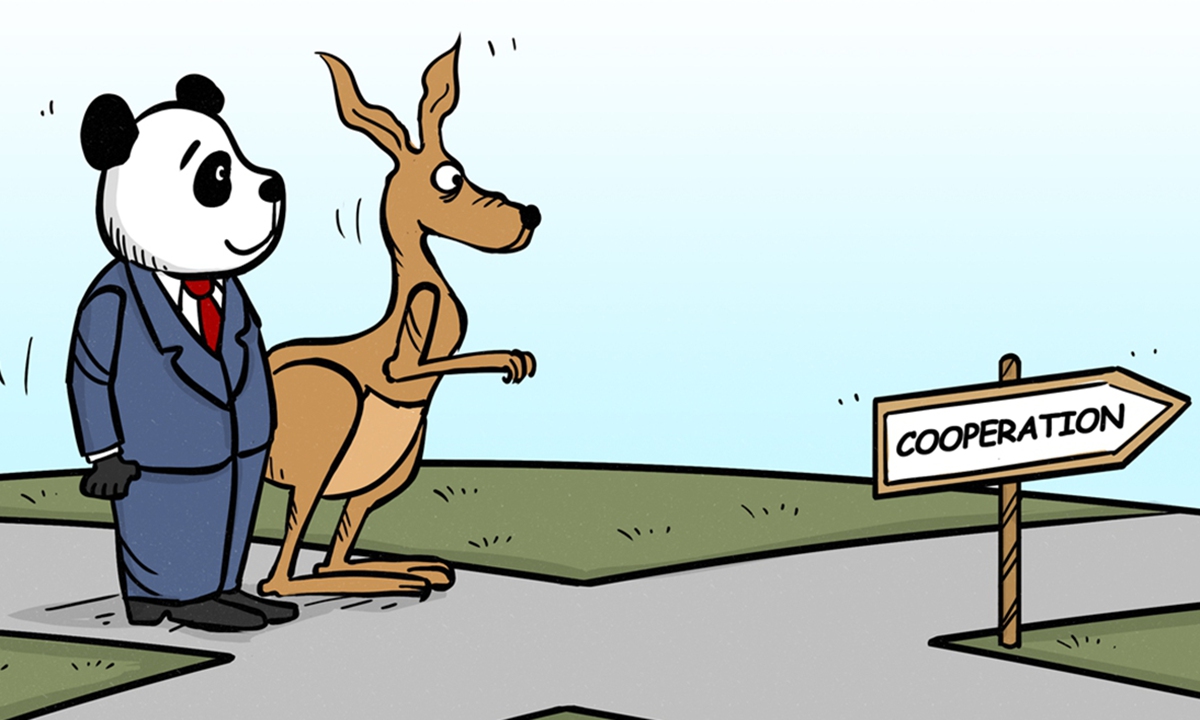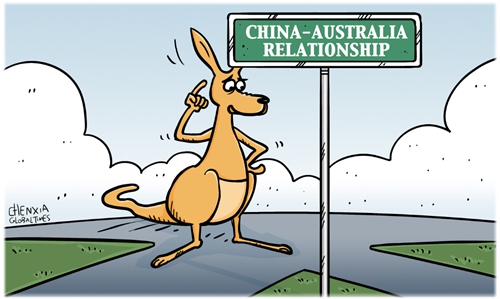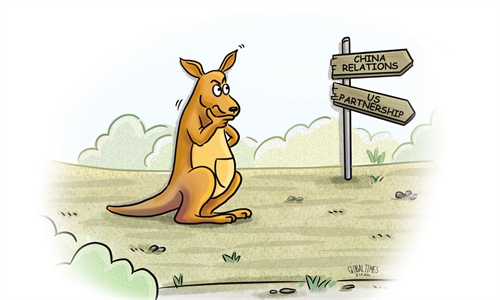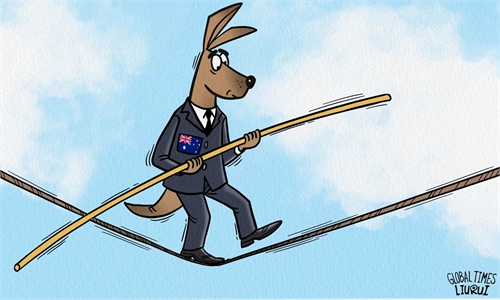Once a model of China’s engagement with the West, China-Australia relations are ready to start a new page in history

Illustration: Chen Xia/GT
It was reported that from November 4 to 7, Australian Prime Minister Anthony Albanese is scheduled to pay his long-anticipated visit to China. Albanese had repeatedly made it clear that he looks forward to the resumption of a prime ministerial visit to China, which had been disrupted during the past several years due to the COVID-19 and strained relations between China and Australia under the Morrison administration.Since the Albanese team took office in May last year, Canberra has broken off from the previous strident and belligerent "megaphone diplomacy" toward China, and more prudent and pragmatic approaches have prevailed over the still recurrent hostile noises from time to time resonating Washington's platitudinous anti-China rhetoric. China, in turn, has reciprocated by being proactive and pragmatic, which ultimately has led to a reversal of the unprecedented decline in bilateral relations since 1972.
Albanese's upcoming visit has both political and economic significance. On October 31, 1973, former Australian prime minister Gough Whitlam paid his first formal visit to China after the two countries established a diplomatic relationship in December 1972. In a way, Albanese's visit pays homage to the forward-looking Labor political giant, taking over his diplomatic legacy to promote mutual understanding and mutual trust between China and Australia. At this critical historical juncture, both countries are ready to start a new page in the history of the bilateral relationship.
Since China and Australia established a formal diplomatic relationship, cooperation and exchanges between the two countries have been steered into the fast track, and trade cooperation has continuously been the booster of bilateral relations. In 1972 the volume of the bilateral trade between the two countries was a pathetic $100 million, while in 2022, even still under the sway of the COVID-19 pandemic, it was as high as over $220.9 billion. In 2007 China overtook Japan to become Australia's largest trade partner, and it still holds this position now. Apart from commodity trade, tourism, international education, finance, healthcare and aged care are also spheres where China and Australia work in conjunction with each other to achieve enormous win-win outcomes. It is worth noting that Albanese has planned his visit to coincide with the 2023 China International Import Expo, which indicates his recognition of the importance of further trade cooperation with China.
During President Xi Jinping's visit to Australia in 2014, the bilateral relationship between China and Australia was elevated to a Comprehensive Strategic Partnership.
The China-Australia relationship was once lauded as one of the most successful stories of China's relationship with Western countries, with textbook exemplars to testify how well we are able to successfully seek common grounds and mutual benefits while retaining differences in traditions, cultures and systems of governance.
This partnership, however mutually beneficial and potentially even more profitable in the decades to come, faced the most intense challenges in the past several years. The previous government in Canberra recklessly acted as a pawn for Washington's "Indo-Pacific Strategy" which aims to deter, disrupt and sabotage China's development. China was illogically positioned as Australia's rival or even adversary, instead of a key partner. Some war-mongering politicians in Canberra even instigated confrontation or even conflict with China, with their outrageous "drums of war" battle cries.
These absurdities led to the most dismaying chapter in the history of China-Australia relations, which neither side would want to return to.
We appreciated the Albanese administration's more rational and practical China policy, which distinguishes itself from Morrison's reckless approaches. China has also adopted a pragmatic approach to sometimes disregard differences in order to strive for common grounds on which we are able to constructively achieve practical results.
There are numerous areas where we have common and interlocking interests and goals, but we recognize differences that sometimes could be significantly contrasting and even contradicting. Meanwhile, both countries need to respect and never challenge each other's sovereignty and territorial integrity.
Albanese has reiterated Australia's foreign policy, with particular reference to his country's relationship with China, that "Australia will cooperate where we can, and disagree where we must." Upon this code of conduct, China and Australia are now on good terms and in agreement on most issues. A new model of practical partnership needs to be ushered in and promoted, based on genuine respect and constructiveness to bring about more mutual benefits.
The author is president of the Chinese Association of Australian Studies and director of the Australian Studies Centre at East China Normal University. opinion@globaltimes.com.cn



